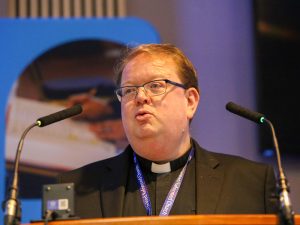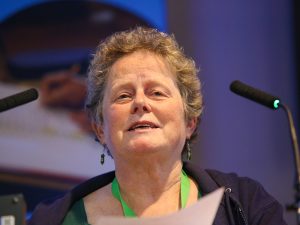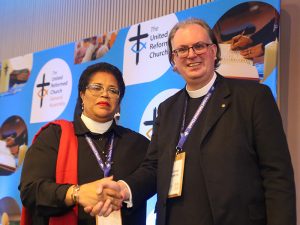Day three of the 2024 General Assembly of the United Reformed Church began with worship and “marching in the light of God”, to the rhythm of drums played by the Moderator’s chaplain, the Revd Stephen Ansa-Addo.
If representatives didn’t feel awake at the start, they did by the end – spontaneous applause followed the singing. Stephen’s fellow chaplain, Karen Campbell, introduced the morning’s innovation question: “What needs shaking?” Feedback from buzz groups in the room and thoughts shared in the cloud via QR code was saved for later.
Stephen shared the encounter of Jesus with the enquirer Nicodemus as described in the Gospel of John. This was the story that the Revd Dr Michael Jagessar drew on in his pre-recorded Bible Study.

Dr Jagessar invited Assembly to consider what timely words are being addressed to “the grey-haired cloud of witnesses”; what is Jesus saying to “you excessively wordy Protestants?”.
Warning Assembly not to confuse agenda with mission, he asked if we can “let go” and trust the Spirit to take their own trajectory and transform us in the journey of our lives.
Turning to Jesus’ encounter with Nicodemus, Dr Jagessar said “the maverick religious teacher” draws “curious Nico” into a space that makes him reconsider the answers and teaching he grew up with. His religious tradition and the detailed tenets of the faith were leading him along a way that lacked something deeper. He was curious about Jesus’ mantra: “You have heard it said, but I say unto you…”
We are told curiosity kills the cat, said Dr Jagessar, “but that’s a lie!” Curiosity allows the birthing of the new and is nothing less than disobedience against the status quo. Mystery, he added, is not the absence of meaning but more meaning than we can comprehend.
He invited listeners to imagine Jesus saying to General Assembly, “You can’t imagine what I am saying from where you are, you must be reborn again”, not maintaining the same inhabited space but walking the way of Jesus in a never-ending process of dying and rising. “Trust the wind, and trust the Spirit, General Assembly,” he said. “Surprise us into believing what we cannot see.”
Dr Jagessar concluded by saying we should not confuse our constitutional obligations with the way of “the give-away God”. Like Nicodemus, we must unlearn the obedience that chains us to the neat agendas we’ve crafted. He asked: What if the Spirit has urged a moratorium on our excessive use of words? What would happen if the Clerk of Assembly said, “Moderator, on this matter, I suggest we should disobey the manual and listen to the Word of God”?
Session seven
Paper N1 Church Life Review
John Bradbury, General Secretary of the URC, brought General Assembly up to date with the completion of the first phase of the Church Life Review, and Myles Dunnett, Church Life Review Programme Manager, explained the second phase.
Jeremiah’s message to the exiles has unexpectedly become text for Church Life Review, John said: ‘Build houses and live in them; plant gardens and eat what they produce.’ The review came out of a sense in the URC of decline and the burden of regulation, out of budget deficit and out-of-date structures, and a belief that we are called not to give up but to find new ways to a thriving future.
Under the first Church Life Review Group formed in 2021, John said, the first phase was exploratory. Research into local congregations by Theos found the URC to be a small Church making a big difference; tired, lacking in people; good at community engagement, less good at discipleship and evangelism.

Forensic accounting by MKS found ‘we are selling family silver to keep going’, John said. The work of synods is funded by the sale of buildings; and yet we for now selling faster than we can spend.
Phase one of the review raised the question: how do we use the resources we have to relieve tiredness and engage in evangelism? What would it look like to view our resources more collectively? How can synods work together to deliver needed support to local congregations?
Myles explained that phase two of the review is the design phase. It consists of three
work streams to unburden local churches:
- Financial resource sharing
- Shared support services
- Employment of lay workers
The attempt to set up three task groups failed for lack of available personnel, so instead there is one steering group with eight members.
A finance consultation took place in June and other consultations will follow.
The greatest progress so far, Myles said, was in the area of financial resource sharing. The review group is now developing ‘living labs’, which involve either looking at existing successful examples of sharing in synods, with a view to making them more widely available, or trialling new work.
Recommendations will be brought to General Assembly in 2025
John added that the Mission and Discipleship committees are working on the evangelism strand of the review.
Myles announced that the September issue of Reform would have a major focus on the Church Life Review, including a vision of what the future could look like when the work is complete, and an update on the process.
Asked where the future of the Equalities Committee fits with this, John said the decision had been taken to use external consultants to do this work. This had proved hard, but it may now be getting somewhere. In the meantime the committee continues.
Session eight
Paper X2 North Western Synod
The Revd Clare Downing, Moderator of the North Western Synod, presented Paper X2 reminding that the resolutions 52 & 53 had been reworded and the amended versions were on page four of Friday’s order paper.
Clare noted that within many synods there are churches in areas of deprivation that have simply closed or disappeared. In North Western, 38 out of 104 locations of church buildings are in the top 10% of most deprived parishes in England. That is quite a significant issue she said, and referred to the Community Project Awards that was held at the previous day of Assembly, where Assembly learned about a project in Sherbourne. Clare said that she was familiar with Sherbourne, that it was a nice area and although will never be within the top 10% of deprived areas in the UK, it still has people on the margins.
Clare clarified that the paper is about people on the margins, not just about people in financial poverty, but that margins involve those living in coastal poverty or rural isolation for example.

Clare explained that the work that NW has been doing with people on the margin is very much about building upon work that is already being carried out, not contradicting it.
North Western Synod is questioning how the URC can use buildings who might not have a viable congregation there. How can the URC replant in those church areas, how can the Church be different?
Clare said commented that the URC has always been involved in community. “It’s one of our strengths,” said Clare, a point also made in the Theos Report.
Clare said the aim of the resolutions and the strategy is to make sure that work is not only shared to try to reduce the need for others to go over the same ground, but to challenge how to use the ideas within the strategy in synod areas to support the work with people on the margins.
During the discussion phase, an ecumenical colleague highly commended the report and the resolution. Saying that the church has to be at the margins in many ways, not just in relation to poverty, but the other ways that people can be on the margins.
A CRCW remarked how touched they were about the paper reflecting that it is the work of the CRCW on a daily basis and asked if CRCWs could be involved with the consultation process. Another urged that rural areas are areas of deprivation too, in terms of not having access to modern technology, healthcare as cities do or transport. Concerns were expressed about where the funds to support such work would come from and questions were asked on how the paper fed into the Church Life Review. It was then suggested that the paper is incorporated into the Church Life Review, and that the review explores the feasibility of establishing a “community enabling fund” that any church can apply to and report to the Extraordinary General Assembly in November 2025, a point accepted by Assembly.
After the discussion phase, Clare thanked those who had commented on the paper for their encouragement. The resolutions were then passed.
En Bloc
The following resolutions were passed en bloc. En bloc resolutions are voted on without debate, having been deemed uncontroversial. This has no reflection on their importance. The full reports and resolutions in each case can be read here:
A3 Terms of Reference for the Children’s and Youth Work Committee
Revised terms of reference for the committee reflecting its changed remit since 1994 and adding role descriptors.
A4 Terms of Reference for the Worship, Faith and Order Committee
Recording the terms of reference for the committee, including support and oversight of the Minister for Digital Worship.
A5 Terms of Reference for the Ministries Committee
Revised terms of reference for the committee reflecting its changed remit since 1984.
A6 Terms of Reference for the Pastoral Reference and Welfare Committee
Revised terms of reference for the committee.
A7 Terms of Reference for the Education and Learning Committee
Revised terms of reference for the committee.
A10 New Nominations Committee and safer recruitment
Appointments to the Nominations Committee, including Victoria Paulding as Convenor.
H2 Change of name to the Accreditations sub-committee
The name of the Accreditations (CRCW & SCM) Sub-Committee changes to the Accreditations Sub-Committee, reflecting the fact that its remit is wider than Church Related Community Work and Special Category Ministry.
H6 Ministry in the United Reformed Church
Changes to Schedule A of The Manual confirming the status of URC ministers as office-holders of the church without contractual relations with the church.
H8 Amending the Basis of Union Paragraph 24
Changes to rules about the wording of affirmations made by those entering ministries in the URC.
P1 Local United Reformed Church Constitutions
Changes to constitutions of for local churches.
J1 Nominations
Enacts the new committee structure of the URC and makes appointments.
J2 Nominations
Supplementary nominations
T1 Safeguarding
Annual report of the Safeguarding Committee, highlighting risk areas, areas of development and summarising the annual Church safeguarding returns for 2023.
X1 Northstowe Church Network (LEP) becoming a local United Reformed Church
Receives Northstowe Church Network as a local church in the URC.
Clerk of the General Assembly
The Revd Dr Michael Hopkins, completes his term as Clerk of the General Assembly at the 2024 General Assembly, a post he has held for 10 years. He was thanked for his dedicated serviced and presented with a gift. He briefly addressed Assembly and thanked all for their support. He is succeeded by the Revd Sarah Moore, Transition Minister for the National Synod of Scotland.

Session nine
Celebrating Jubilee Ministers and greeting new ministers
General Assembly celebrated and gave thanks for “Jubilee ministers” who are marking notable ordination anniversaries in 2024:
75 years
Peter John Humphrey Brewer
70 years
Malcolm Hill, Brian Edward Ranford and Anthony David Tucker
60 years
Robert John Blows, Anthony John Coates, James Ashford Hollyman, Neville Jarrett, Frank Jones, Joseph Ross McLaren, Derek Alan Newton, Robert Freeland Philip, Adrian Stanley John Phippen, Stephen Mitchell Thornton, and Derek Geoffrey Wensley
50 years
George Clifford Graham Bembridge, Bernard Alan Collins, Richard Frank Davis, Anita Margaret Evans, Peter Heckels, Walter John Houston, David Howlett, Ann Frances Jackson, Anthony Roger Lee, William Dick McNaughton, Gerald Christopher Moule, John Maldwyn Parry, and Rodney John Wood
Fifteen new ministers (stipendiary, non-stipendiary and one CRCW) were ordained or commissioned into the URC in 2023. Those present were greeted by the Moderator:
- Gillian Barbara Bailey
- Rodolphe Blanchard-Kowal
- Stanslous Chatikobo
- David George Cumbers
- Margaret Ruth Dewis
- Nathan Glover Eddy
- Gilbert Esuh Esambe
- Alice Victoria Louise Gilbert
- Walt Wallace Johnson
- Karen Helen Jones
- Derek McDonald
- John Francis Arthur O’Hanlon
- Roberta Mary Ritson
- Mark Andew Rodgers
- Louise Sanders
Session ten
Paper H4 Plan Amendments to the Plan for Partnership in Ministerial Remuneration
The Convenor, the Revd Mary Thomas, brought four amendments to the Plan for Partnership in Ministerial Remuneration. She said the plan affects a wide range of interested parties and recognised that it contains some ambiguities, so the Committee is open to consulting widely on any changes.
- The first amendment was designed, for legal reasons, to confirm that a “manse means a home for the minister and their immediate family (spouse/partner and dependent children)”.
A number of speakers felt that the wording emphasised legalities at the expense of grace and flexibility. It recognises that adult children have rights which, in order to insure against any unwanted complications, need to be waved when living in a home owned or leased by the Church. However, one minister felt the wording might imply that a synod could prevent an adult child living with their family in a manse. Another said the new wording was welcome because it meant he wouldn’t have to ask his life partner to “sign a piece of paper” to live in the same house as him.
The General Secretary said that the debate highlighted the complexity of the URC’s structures across 13 different synods, and that this resolution was an attempt to avoid devising the same guidelines 13 times over. A synod moderator requested guidelines (in addition to this resolution) for synods to give to ministers to ensure consistency.
Following a vote, Assembly agreed the resolution, but with an assurance that further work will be done, especially around guidelines.
- Resolution 22 asked Assembly to raise the Fixed Car allowance from £1,200 to £2,400 and the Fixed Motorcycle allowance from £300 to £600 in the Plan for Partnership, with effect from 1 January 2025. The convenor said arrangements were in place for cyclists and agreed to look at other related issues. One speaker asked if an across-the-board increase in the allowance would have a disproportionate impact on pastorates in lower income communities. The Secretary said this matter could be looked at further.
While one minister expressed strong gratitude for the proposal, another questioned the increased burden on local churches. The Committee said it has pledged to review the allowance on a more regular basis.
- Resolution 23 allowed a redefinition of the ministerial working week in terms of hours. In part this reflected the difficulty many ministers have taking a fixed day off. The Secretary said that the resolution was designed to insure that if a regular day could not be taken that the time would be taken at some other point, and agreed this was an act of self-care.
A Methodist review is exploring the idea that ministers take two days off, and another speaker wanted the wording around time off strengthened because “our God said ‘Stop’”. However, the Clerk said the resolution was brought only to amend how the policy is described and it was carried.
- Finally, General Assembly agreed changes to wording about holiday entitlement to include when to carry over holiday to the following year for sick leave, parental leave or Jury Service; to clarify expectations for sabbatical and holiday leave; and to include Bank Holidays and days in lieu of Christmas Day and Good Friday.
In Memoriam
Towards the end of day three of Assembly, respect was paid to those ministers who have died since the last Assembly.
Proceedings then closed with worship.
Reporting team: Andy Jackson, Ann-Marie Nye, Steve Tomkins, Laurence Wareing. Photos: Chris Andrews.

